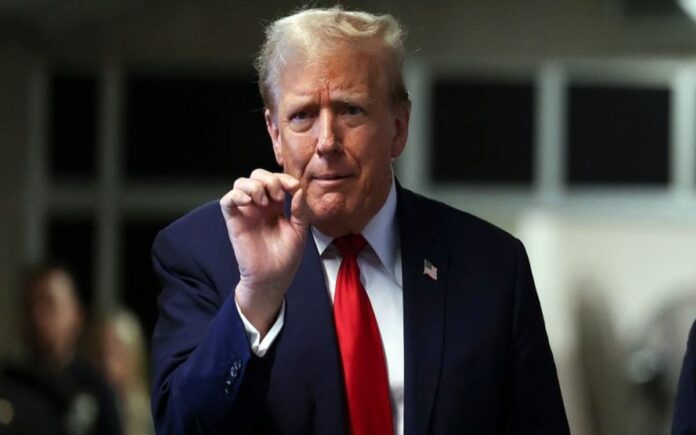Washington: On Thursday, the U.S. Supreme Court denied a federal trademark for the phrase “Trump Too Small”—a pointed critique of former President Donald Trump—overruling a California lawyer’s assertion that the trademark denial infringed on his constitutional free speech rights.
The justices reversed a lower court’s decision, which had determined that the U.S. Patent and Trademark Office’s (USPTO) rejection of Steve Elster’s trademark application violated the First Amendment of the U.S. Constitution. Elster had sought to register the trademark to use the phrase exclusively on T-shirts.
This case revolved around a provision in a 1946 federal trademark law that prohibits the registration of any trademark incorporating a living person’s name without their written consent. The central issue was whether First Amendment protections for criticizing public figures supersede the USPTO’s concerns about protecting Trump’s rights, as the lower court had previously concluded.
The Biden administration argued that the law is a lawful condition on a government benefit and does not unlawfully suppress free speech, as it applies uniformly regardless of the viewpoint expressed. Elster contended that allowing public figures to trademark positive messages about themselves while forbidding critical ones constitutes viewpoint discrimination.
Elster filed for the trademark in 2018, intending to use it on shirts alongside a satirical hand gesture illustration, referencing a 2016 Republican presidential primary debate exchange between Trump and Senator Marco Rubio. Trump had belittled Rubio as “Little Marco”, prompting Rubio to quip about Trump’s allegedly small hands. During the debate, Trump famously retorted, “Look at those hands. Are they small hands? If they’re small, something else must be small. I guarantee you, there’s no problem. I guarantee it.”
Elster argued that “Trump Too Small” conveyed his opinion on “the smallness of Donald Trump’s overall approach to governing.” Trump was serving as president at the time of the application.
Also Read | U.S. Supreme Court Rules in Favor of Starbucks in Dispute with Fired Pro-Union Workers
Although Trump, currently the leading candidate for the Republican nomination to oppose Democratic President Joe Biden in the upcoming election, is not directly involved in the case, nor has he commented on it, his rights were central to the legal dispute.
The USPTO initially rejected Elster’s application, but the Washington-based U.S. Court of Appeals for the Federal Circuit ruled in Elster’s favor. The appellate court found that the government’s interest in safeguarding the privacy and publicity rights of public figures did not outweigh Elster’s First Amendment right to criticize them.
Also Read | Broadcom Stock Soars on AI Chip Demand and Announces 10-for-1 Split
Elster’s trademark application remained pending at the USPTO awaiting the Supreme Court’s decision.
In recent years, the Supreme Court has invalidated two trademark laws on free speech grounds. In 2017, it sided with the Asian-American rock band The Slants against a prohibition on trademarks that “disparage”, and in 2019, it ruled in favor of artist Erik Brunetti, striking down a ban on “immoral” or “scandalous” trademarks in a case involving his “FUCT” brand.



